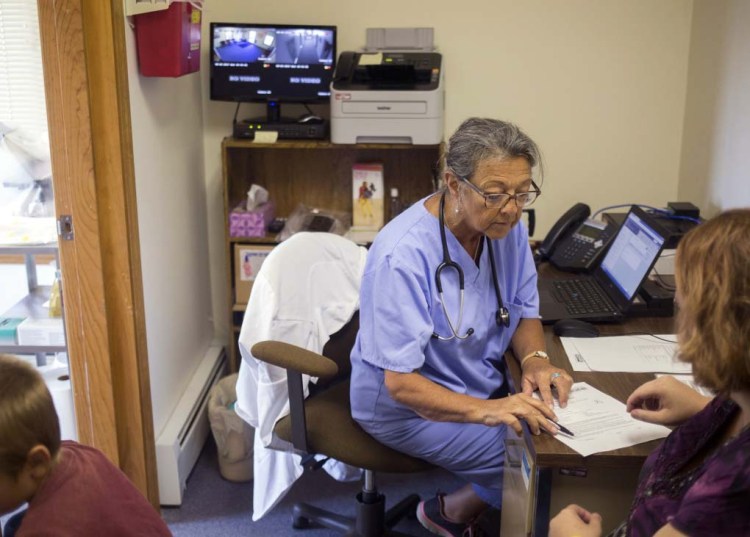AUGUSTA — Gov. Janet Mills introduced a bill Thursday that would expand access to abortion services for women in Maine by allowing physician assistants, nurse practitioners and nurse midwives to perform the procedures.
The measure is expected to have broad support among Democrats, who control the Legislature, but will draw fire from religious conservatives and most Republicans, who oppose expanding abortion services.
A similar version of the legislation, offered by Mills in 2018 when she was the state’s attorney general during the administration of Republican Gov. Paul LePage, failed to gain traction in the Legislature. But Mills, a Democrat, is backed by new Democratic majorities in both the Maine House and Senate.
If the bill becomes law, Maine would become the ninth state – and fourth in the Northeast – to authorize health care practitioners other than physicians to provide abortion services, according to the Guttmacher Institute, a reproductive health and rights research organization.
The legislation comes at a time when abortion rates have declined dramatically in Maine and around the nation. As Maine’s population has remained relatively stable, the number of abortions performed in the state declined from 2,653 in 2005 to 1,836 in 2015, a 31 percent drop, according to the most recent figures available from the Maine Center for Disease Control and Prevention.
Health experts cite improved birth-control methods as one of the major factors in the decline.
House Speaker Sara Gideon, D-Freeport, is the primary sponsor of the bill before the Legislature.

Gov. Janet Mills issued a statement saying, “Every woman in Maine should be able to access reproductive health care when and where she needs it, regardless of her zip code.”
“Every woman in Maine should be able to access reproductive health care when and where she needs it, regardless of her zip code,” Mills said in a prepared statement. “Allowing advanced nurse practitioners and physician assistants to perform medication-administered abortions, which are already permitted in other states, will ensure Maine women, especially in rural areas of our state, can access reproductive health care services.”
Gideon said the measure was especially important for women in rural parts of Maine.
“Women in rural Maine have been disproportionately harmed, where the sheer logistics of arranging for travel, taking time off work and securing child care create an often insurmountable barrier to accessing the full range of family planning services,” Gideon said, also in a prepared statement.
Priscilla Perry, a nurse practitioner at clinics in Machias, Bangor and Ellsworth, said the change removes barriers for women in obtaining care. Perry said she currently has to coordinate medication-induced abortions with a physician, and then the patient has to take the medication in the presence of the physician.
Perry said there is no medication she can prescribe for a man that requires the same procedures and oversight. She said the change would not only help women, but it would also save time for health care providers, including physicians, allowing them to focus on other patients.
“This is one less barrier for women, especially in rural areas of Maine, where they don’t always have the transportation options that women in more urban areas have,” Perry said. “It is a really good idea to have that option open for women if they need it.”
The Christian Civic League of Maine will oppose the bill, said Carroll Conley, the group’s executive director.
“We just feel that health care and any expansion of it should be life-affirming and not life-ending,” Conley said. “Making health care more accessible is not contrary to our mission as long as it’s life-affirming.”

Carroll Conley of the Christian Civic League of Maine said, “Health care and any expansion of it should be life-affirming and not life-ending.”
Maine law now prohibits advanced practice clinicians, including nurse practitioners, nurse midwives and physician assistants, from providing abortion care, although the law does not cite any medical rationale. Currently there are three clinics – in Augusta, Bangor and Portland – where abortions are performed in Maine.
The ACLU of Maine and Planned Parenthood of Northern New England said they welcomed the legislation. Both groups are plaintiffs in a federal lawsuit challenging the state law that prohibits nurse practitioners, physician assistants and nurse midwives from performing abortions. The lawsuit, filed in September 2017, is pending in the courts.
According to the Guttmacher Institute, 42 states require abortions to be performed by a licensed physician. In 34 states, the clinicians who perform medication-induced abortions must be licensed physicians, according to the institute’s website. And 17 states require the clinician performing a medication-induced abortion to be physically present, effectively eliminating the use of telemedicine to prescribe medication for an abortion.
Three of Maine’s New England neighbors, Connecticut, Vermont and New Hampshire, don’t require that doctors perform abortions. In Massachusetts and Rhode Island, non-physicians can perform medication-induced abortions.
“The (advanced practice clinician) ban makes it harder for my patients to access the care they need, is medically unnecessary, and contributes to abortion stigma,” said Alison Bates, a nurse practitioner with Planned Parenthood. “It does not protect patient health or safety and in fact harms patients by limiting access to time-sensitive medical care – care they may otherwise receive from their provider of choice, in their community of choice.”
Oamshri Amarasingham, the advocacy director for ACLU of Maine, said many Mainers already have limited access to health care services, and women should be able to get the care they want from providers they prefer in their own communities.
“Enough is enough,” Amarasingham said. “Limited transportation options, brutal winters, and a shortage of health care providers – Mainers face more than enough obstacles to accessing needed health care without having medically unjustified laws piled on top.”
Mills’ bill will be the subject of a public hearing that has yet to be scheduled before the Legislature’s Health and Human Service Committee.
Scott Thistle can be contacted at 713-6720 or at:
sthistle@pressherald.com
Twitter: thisdog
Send questions/comments to the editors.



